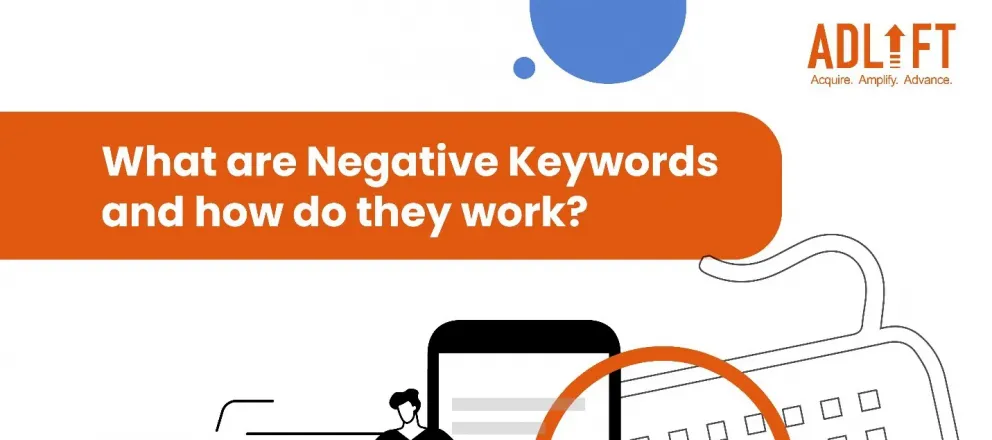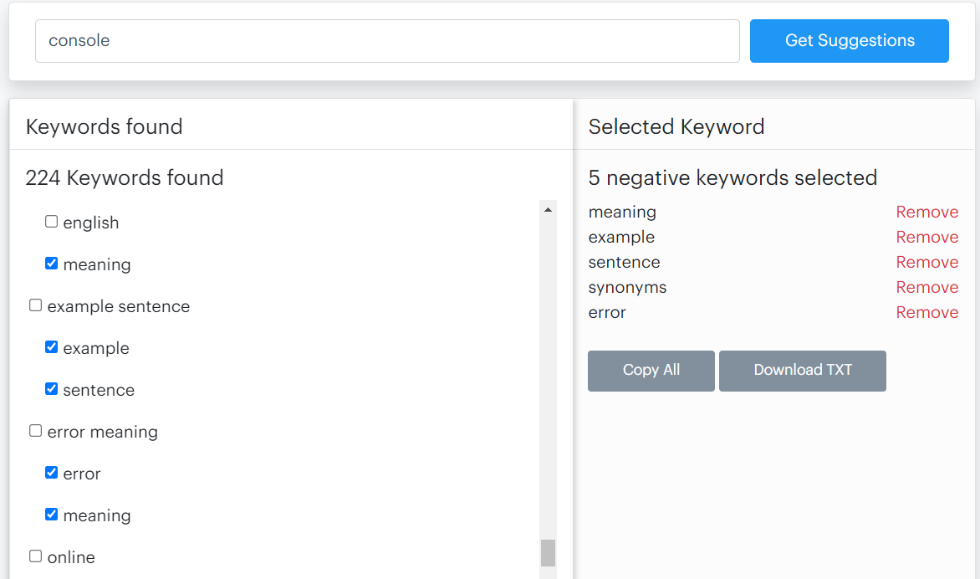The Truth About Negative Keywords

Imagine setting up a new business where you sell furniture. Yaay!
You decide to set up ads and target the term ‘console’. Now, some of the clicks on your ad are related to table consoles but there are also clicks that are totally unrelated.
Confusing enough, right?
We’ll explain. So, your ad might have also been triggered for terms like ‘PlayStation Console’. And since you do not sell this stuff, you are simply wasting your ad spend.
So how do you fix this problem? It’s simple. You add ‘PlayStation Console’ as the negative keyword. This will stop Google from showing your ad when people search for this term.
Now it sounds interesting?
Read on to understand what are negative keywords and how they work.

Negative Keywords: What Do They Mean?
Negative keywords are the terms used in advertising to improve ROI and targeting. These terms tell the host not to trigger an ad for the keywords entered.
For example, if you add the term ‘free’, the search engine won’t show your ad for queries containing the word ‘free’ in them. So, what does it do for you?
When you stop certain keywords from being associated with your ad, you can be certain that the ad will appear to the right audience. For example, if you are running an ad for ‘rock climbing for kids’, you are likely to bid on search queries like ‘rock climbing equipment’ or ‘rock climbing gear’.
But these are very broad terms, and if someone searches for combinations like adult climbing gear, your ad will show up. However, someone searching for adult climbing gear has no interest in rock climbing for kids.
These ads showing up on your search are nothing but a waste of ad spending because people are most likely to ignore them.
How Do Negative Keywords Work?
Negative keywords don’t work like positive keywords and need an exact match.
Usually, Google associates variations of keywords with the same query, but it doesn’t happen with negative keywords.
This means when you add a negative keyword, you must also add its synonyms, misspellings, and plural versions. For example, if the negative keyword is hill, you must also add terms like hills, hils, hilles, etc.
Benefits of Using Negative Keywords
Let us make this easier for you.
If you own a business and your ad keeps showing up for irrelevant queries, you are simply signaling Google that the ad is not relevant for the target audience. Consequently, you’ll be charged more to get visibility in search results.
This is because CTR has a direct impact on the Quality Score. The lower your expected CTR, the lower the quality score and the less relevant your ad will be to Google.
Take a look at the benefits of using negative keywords.
Improves CTR
The Click-through rate is defined as the percentage of impressions that result in a click. So, it’s obvious that a high CTR is important for every business owner. By showing your ad to fewer uninterested users, you will have less wasted impressions and, consequently, less spending.
Boosts Conversions
By improving the search query of your ads, you get high conversion rates to the website. This way, you get more qualified leads to your site, thereby increasing the conversion rate.
Reduces Cost per Conversion
Another benefit of using negative keywords is reducing the cost per conversion. With a high conversion rate, you send potential traffic to the website. And why is that?
This is because you are only targeting people who are interested in buying the products you offer. So, only potential customers are clicking on your ads, reducing the cost per click conversion.
Saves Money
If people who are not interested in your ad click on it, you are wasting your money. Fret not! Incorporating negative keywords can help save some bucks. This is because negative keywords help you target people who are genuinely interested in your ad.
Negative keywords can help save you money on –
- Irrelevant searches for the ad campaign
- Searches with no relevance to the products or services
- Searches with a similar brand name
- Searches related to the competitor’s brand name
Digging Deeper: How Do You Find Negative Keywords?
When creating a negative keyword list, you must start by identifying terms similar to your target keyword that may cater to users looking for a completely different thing. This could include products and services mistaken for certain terms.
For instance, a person selling women’s work boots may want to use negative keywords like cowboy boots or rain boots to avoid an irrelevant audience.
Now, finding negative keywords can be tricky, no matter how much you brainstorm. Good news! Several tools can help find negative keywords. For example, Google Search Term results show specific keywords people searched for that triggered your ad.
You can leverage the power of this tool to understand what keywords generate clicks and what search terms people are using that are unrelated to your products and services.
So, Are Negative Keywords Helpful?
Yes, if you want to save money and show your ad to users interested in your offerings.
No, if you want your ad to be triggered even for non-relevant searches and, in the process, increase your spending.
That was pretty easy to understand, right? Negative keywords are an underrated part of a marketing strategy, but they can do wonders for your brand. While using regular keywords helps get high traction, using negative keywords helps filter out irrelevant traction.
So, if you want to focus on clicks that will actually convert, consider using negative keywords right away. And if you don’t know how to proceed, we’ll be happy to help.
At AdLift, we aim to get you converts by using negative keywords along with other marketing strategies. Visit our website, explore our services and let’s collaborate to benefit from the power of negative keywords.
